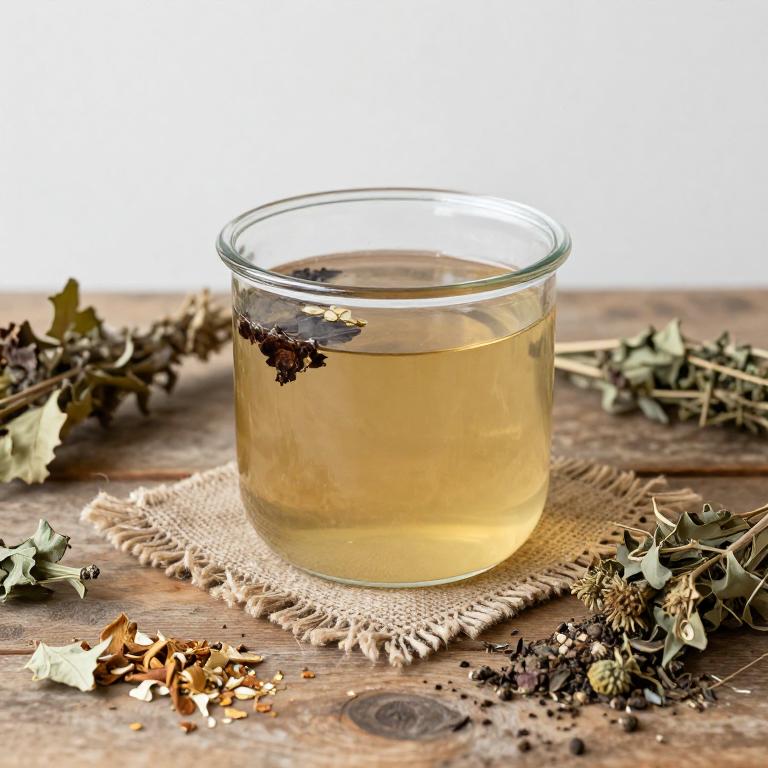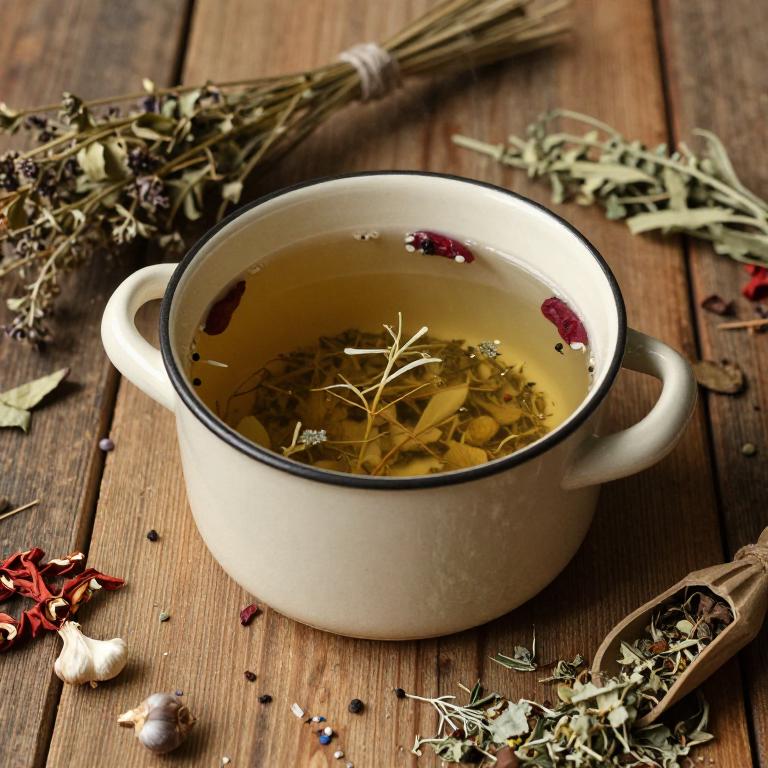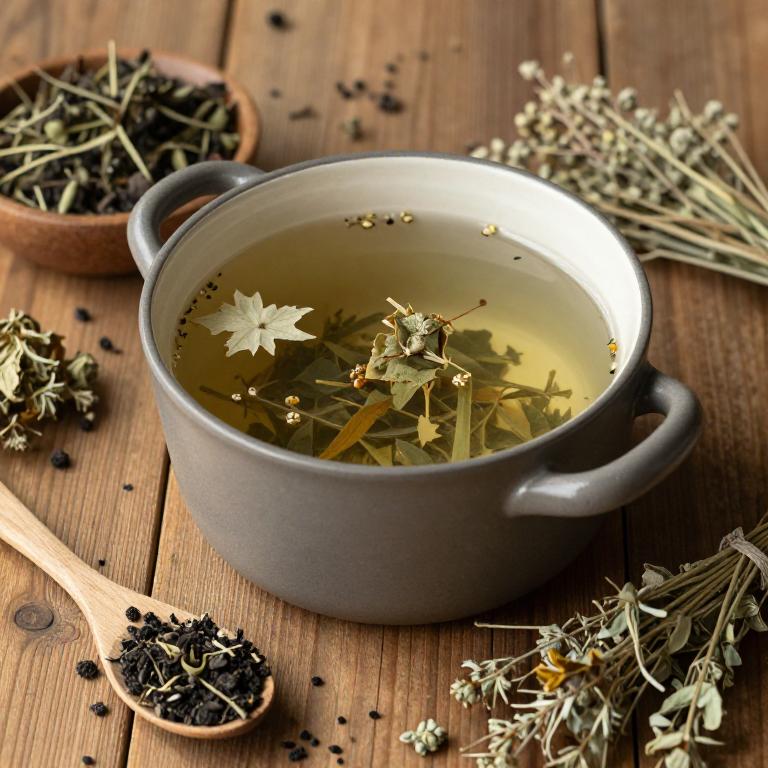10 Best Herbal Decoctions For Acid Reflux

Herbal decoctions have been traditionally used to alleviate symptoms of acid reflux by soothing the digestive system and reducing stomach acidity.
Common herbs such as ginger, licorice root, and fennel are often included in these decoctions due to their anti-inflammatory and antispasmodic properties. To prepare a decoction, these herbs are simmered in water for an extended period to extract their active compounds, which can then be consumed as a tea. Regular consumption of such herbal remedies may help strengthen the lower esophageal sphincter and reduce the frequency of heartburn episodes.
However, individuals should consult with a healthcare provider before using herbal decoctions, especially if they are taking medications or have underlying health conditions.
Table of Contents
- 1. Licorice (Glycyrrhiza glabra)
- 2. Thistle (Silybum marianum)
- 3. Fennel (Foeniculum vulgare)
- 4. Ginger (Zingiber officinale)
- 5. Cumin (Cuminum cyminum)
- 6. Stinging nettle (Urtica dioica)
- 7. Chamomile (Matricaria chamomilla)
- 8. Blessed thistle (Cnicus benedictus)
- 9. Common grape (Vitis vinifera)
- 10. Peppermint (Mentha piperita)
1. Licorice (Glycyrrhiza glabra)

Glycyrrhiza glabra, commonly known as licorice root, has been traditionally used in herbal medicine for its soothing properties, and its decoctions are often employed to alleviate symptoms of acid reflux.
The active compounds in licorice root, such as glycyrrhizin and flavonoids, may help reduce gastric acid secretion and protect the stomach lining, thereby providing relief from heartburn and indigestion. However, long-term use of licorice root decoctions can lead to side effects such as hypertension and electrolyte imbalances due to its mineralocorticoid-like effects. It is important to consult a healthcare professional before using licorice root, especially for individuals with pre-existing health conditions or those taking medications.
Despite its potential benefits, licorice root should be used as part of a holistic approach to managing acid reflux, in conjunction with lifestyle and dietary modifications.
2. Thistle (Silybum marianum)

Silybum marianum, commonly known as milk thistle, is often used in herbal decoctions to support digestive health.
Its active compound, silymarin, is believed to have antioxidant and anti-inflammatory properties that may help protect the stomach lining. Some studies suggest that silybum marianum may reduce the production of stomach acid, making it a potential natural remedy for acid reflux. However, more research is needed to confirm its efficacy and safety for this specific condition.
While it is generally considered safe, individuals with acid reflux should consult a healthcare provider before using it as part of their treatment plan.
3. Fennel (Foeniculum vulgare)

Foeniculum vulgare, commonly known as fennel, has been traditionally used in herbal medicine for its potential benefits in managing acid reflux.
The herb contains compounds such as anethole and flavonoids, which may help reduce gastric acid secretion and soothe the esophageal lining. A common preparation involves making a herbal decoction by steeping dried fennel seeds in hot water, which can be consumed several times a day. Some studies suggest that fennel may enhance digestive function and relieve symptoms like heartburn and bloating associated with acid reflux.
However, it is important to consult a healthcare professional before using fennel decoctions, especially for individuals with existing medical conditions or those taking medications.
4. Ginger (Zingiber officinale)

Zingiber officinale, commonly known as ginger, has been traditionally used in herbal medicine for its soothing effects on the digestive system.
Ginger herbal decoctions, made by simmering fresh or dried ginger root in water, are often recommended for individuals suffering from acid reflux due to their anti-inflammatory and carminative properties. These decoctions help reduce stomach acid production and soothe the lining of the esophagus, providing relief from heartburn and indigestion. The active compounds in ginger, such as gingerol and shogaol, are believed to relax the lower esophageal sphincter and improve gastric emptying.
However, while ginger is generally considered safe, it should be used in moderation and under the guidance of a healthcare professional, especially for those with severe or persistent acid reflux.
5. Cumin (Cuminum cyminum)

Cuminum cyminum, commonly known as cumin, has been traditionally used in herbal medicine for its potential digestive benefits.
When prepared as a herbal decoction, cumin is often brewed by simmering the seeds in water to extract its active compounds. This decoction is believed to aid in reducing symptoms of acid reflux by promoting the secretion of digestive enzymes and enhancing gastrointestinal motility. The essential oils in cumin, such as limonene and cineole, may help neutralize stomach acid and soothe the esophageal lining.
However, while some studies suggest its efficacy, individuals with acid reflux should consult a healthcare provider before using cumin as a treatment to ensure it is safe and appropriate for their condition.
6. Stinging nettle (Urtica dioica)

Urtica dioica, commonly known as stinging nettle, has been traditionally used in herbal medicine for its potential digestive benefits.
When prepared as a decoction, stinging nettle can help soothe the lining of the esophagus and stomach, potentially offering relief from acid reflux symptoms. The plant contains compounds such as flavonoids and mucilage, which may reduce inflammation and neutralize stomach acid. However, it is important to consult with a healthcare provider before using stinging nettle, as it may interact with certain medications or exacerbate conditions in some individuals.
While some studies suggest its efficacy, more research is needed to fully understand its role in managing acid reflux.
7. Chamomile (Matricaria chamomilla)

Matricaria chamomilla, commonly known as chamomile, has been traditionally used for its calming and anti-inflammatory properties.
Herbal decoctions made from chamomile flowers are often prepared by steeping the dried flowers in hot water, creating a soothing tea. These decoctions may help alleviate symptoms of acid reflux by reducing gastric acid secretion and soothing the lining of the esophagus. However, while some studies suggest potential benefits, more research is needed to confirm its efficacy for this condition.
It is advisable to consult a healthcare professional before using chamomile decoctions, especially for individuals with existing health conditions or those taking medications.
8. Blessed thistle (Cnicus benedictus)

Cnicus benedictus, commonly known as St. Benedict's weed, has been traditionally used in herbal medicine for its potential soothing properties.
Herbal decoctions made from the dried leaves and flowers of Cnicus benedictus are believed to help alleviate symptoms of acid reflux by reducing stomach acidity and promoting digestion. These decoctions are typically prepared by simmering the plant material in water for an extended period to extract its active compounds. Some studies suggest that the plant contains compounds with anti-inflammatory and antioxidant properties that may support gastrointestinal health.
However, more scientific research is needed to fully understand its efficacy and safety for treating acid reflux.
9. Common grape (Vitis vinifera)

Vitis vinifera, commonly known as the common grapevine, has been traditionally used in herbal medicine for its various health benefits, including its potential to alleviate symptoms of acid reflux.
Herbal decoctions made from the leaves, seeds, or berries of Vitis vinifera are believed to possess anti-inflammatory and antioxidant properties that may help reduce gastric irritation and neutralize stomach acid. These decoctions are often prepared by simmering the plant material in water for an extended period to extract the active compounds. Some studies suggest that the flavonoids and tannins present in Vitis vinifera may support digestive health by strengthening the lower esophageal sphincter.
However, while anecdotal evidence supports its use, further clinical research is needed to fully understand its efficacy and safety for managing acid reflux.
10. Peppermint (Mentha piperita)

Mentha piperita, commonly known as peppermint, has been traditionally used in herbal medicine for its soothing properties, and its decoctions are often considered for alleviating symptoms of acid reflux.
The active compounds in peppermint, such as menthol and other essential oils, may help relax the lower esophageal sphincter and reduce the sensation of heartburn. However, some studies suggest that peppermint oil can sometimes exacerbate acid reflux in sensitive individuals due to its potential to relax the sphincter muscle. As a result, it is generally recommended to use peppermint herbal decoctions with caution and under the guidance of a healthcare professional.
While some people find relief from peppermint tea, it is not a substitute for medical treatment in severe or chronic cases of acid reflux.